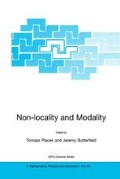Abstract
Reichenbach’s Common Cause Principle is the claim that if two events are correlated, then either there is a causal connection between the correlated events that is responsible for the correlation or there is a third event, a so called (Reichenbachian) common cause, which brings about the correlation. The paper reviews some results concerning Reichenbach’s notion of common cause, results that are directly relevant to the problem of how one can falsify Reichenbach’s Common Cause Principle. Special emphasis will be put on the question of whether EPR-type correlations can have an explanation in terms of Reichenbachian common causes. Most of the results to be recalled indicate that falsifying Reichenbach’s Common Cause Principle is much more tricky than one may have thought and that, contrary to some claims in the literature, there is no conclusive proof yet that the EPR correlations predicted by ordinary, non-relativistic quantum mechanics cannot have a common cause; furthermore, recent results about possible Reichenbachian common causes of correlations predicted by quantum field states between spacelike separated local observable algebras in algebraic quantum field theory strongly indicate that there may very well exist Reichenbachian common causes of superluminal correlations predicted by quantum field theory.
Access this chapter
Tax calculation will be finalised at checkout
Purchases are for personal use only
Preview
Unable to display preview. Download preview PDF.
References
Bana, G. and Durt, T. (1997) Proof of Kolmogorovian Censorship, Foundations of Physics 27, 1355–1373.
Cushing, J. T. and McMullin, E. (eds.) (1989) Philosophical Consequences of Quantum Theory, University of Notre Dame Press, Notre Dame, IL.
Danks, D. and Glymour, C. (2001) Linearity properties of Bayes nets with binary variables, in J. Bréese and D. Koller (eds.), Uncertainty in Artificial Intelligence: Proceedings of the 17th Conference (UAI-2001), Morgan Kaufmann, San Francisco, pp. 98–109.
Garber, W. D. (1975) The connexion of duality and causality properties for generalized free fields, Communications in Mathematical Physics 42, 195–208.
Halvorson, H. and Clifton, R. (2000) Generic Bell correlation between arbitrary local algebras in quantum field theory, Journal of Mathematical Physics 41, 1711–1717.
Hofer-Szabó, G. (1997) The formal existence and uniqueness of the Reichenbachian common cause on Hilbert lattices, International journal of Theoretical Physics 36, 1973–1980.
Hofer-Szabó, G. (1998) Reichenbach’s common cause definition on Hilbert lattices, International Journal of Theoretical Physics 37, 435–443.
Hofer-Szabó, G., Rédei, M., and Szabó, L. E. (1999) On Reichenbach’s common cause principle and Reichenbach’s notion of common cause, The British Journal for the Philosophy of Science 50, 377–399.
Hofer-Szabó, G., Rédei M., and Szabó, L. E. (2000) Common cause completability of classical and quantum probability spaces, International Journal of Theoretical Physics 39, 913–919.
Hofer-Szabó, G., Rédei, M., and Szabó, L. E. (2000) Reichenbach’s Common Cause Principle: Recent results and open problems, Reports on Philosophy 20, 85–107.
Hofer-Szabó, G., Rédei, M., and Szabó, L. E. Common-causes are not common common-causes, forthcoming in Philosophy of Science, preprint: http://philsci-archive.pitt.edu.
Rédei, M. (1997) Reichenbach’s Common Cause Principle and quantum field theory, Foundations of Physics 27, 1309–1321.
Rédei, M. (1998) Quantum Logic in Algebraic Approach, Kluwer Academic Publishers, Dordrecht.
Rédei, M. and Summers, S. J. (2001) Local primitive causality and the common cause principle in quantum field theory, forthcoming in Foundations of Physics, preprint: http://arXiv.org/abs/quant-ph/0108023, or http://philsci-archive.pitt.edu.
Reichenbach, H. (1956) The Direction of Time, University of California Press, Los Angeles, CA.
Salmon, W. C. (1984) Scientific Explanation and the Causal Structure of the World, Princeton University Press, Princeton, NJ.
Summers, S. J. and Werner, R. (1987) Bell’s inequalities and quantum field theory. I. General setting, Journal of Mathematical Physics 28, 2440–2447.
Summers S. J. and Wemer, R. (1987) Maximal violation of Bell’s inequalities is generic in quantum field theory, Communications in Mathematical Physics 110, 247–259.
Summers, S. J. and Werner, R. (1988) Maximal violation of Bell’s inequalities for algebras of observables in tangent spacetime regions, Annales de l’Institut Henri Poincaré-Physique Théorique 49, 215–243.
Summers, S. J. (1990) On the independence of local algebras in quantum field theory, Reviews in Mathematical Physics 2, 201–247.
Szabó, L.E. (2001) Critical reflections on quantum probability theory, in M. Rédei and M. Stöltzner (eds.), John von Neumann and the Foundations in Quantum Physics, Kluwer Academic Publishers, Dordrecht, pp. 201–219.
Szabó, L. E. (2000) Attempt to resolve the EPR-Bell paradox via Reichenbach’s concept of common cause, International Journal of Theoretical Physics 39, 901–911.
van Fraassen, B. C. (1989) The charybdis of realism: Epistemological implications of Bell’s inequality, in J. T. Cushing and E. McMullin (eds.), Philosophical Consequences of Quantum Theory: Reflections on Bell’s Inequality, University of Notre Dame Press, Notre Dame, IL, pp. 97–113.
Author information
Authors and Affiliations
Editor information
Editors and Affiliations
Rights and permissions
Copyright information
© 2002 Springer Science+Business Media Dordrecht
About this chapter
Cite this chapter
Rédei, M. (2002). Reichenbach’s Common Cause Principle and Quantum Correlations. In: Placek, T., Butterfield, J. (eds) Non-locality and Modality. NATO Science Series, vol 64. Springer, Dordrecht. https://doi.org/10.1007/978-94-010-0385-8_17
Download citation
DOI: https://doi.org/10.1007/978-94-010-0385-8_17
Publisher Name: Springer, Dordrecht
Print ISBN: 978-1-4020-0662-3
Online ISBN: 978-94-010-0385-8
eBook Packages: Springer Book Archive

